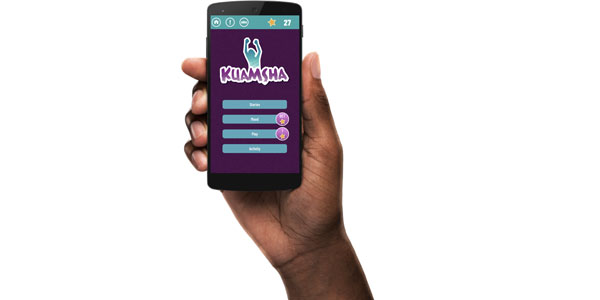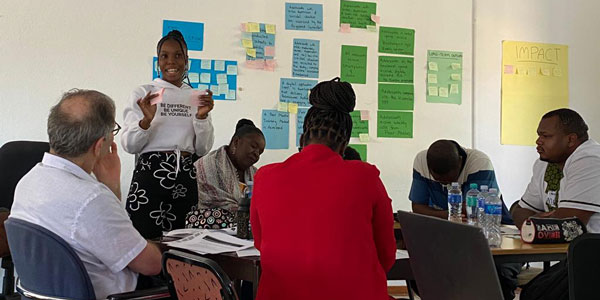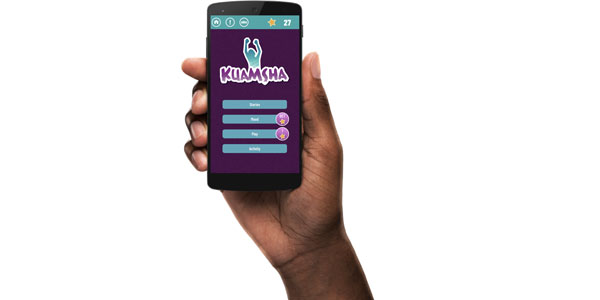– Wits University
The Kuamsha app was developed as part of a study to address depression in adolescents in rural and low resource settings.
The app, based on behavioural activation principles, comprises a six-module interactive narrative game supported by weekly phone calls from trained peer mentors.

Research increasingly supports the effectiveness of digital psychological treatments to address depression amongst adults in both high-income contexts and low- and middle-income settings (LMICs).
However, amongst school-aged adolescents (10-19 years), there is much less evidence. Indeed, in LMICs, only two or three randomised control trials have been conducted to assess the effectiveness of web or app-based digital psychological treatments among adolescents.
Hence the Digital delivery of Behavioural Activation to overcome depression and facilitate social and economic transitions amongst adolescents (DoBAt) study, based at the MRC/Wits Rural Public Health and Health Transitions Unit (MRC/Wits-Agincourt) in Mpumalanga, South Africa.
Dr Bianca Moffett, DoBAt project manager, says, “While there are a lot of mental health apps on the market, very few have been specifically developed for or rigorously evaluated amongst adolescents in low-resource or culturally diverse contexts.”
Behavioural activation and digital interventions
The DoBAt study aimed to design and evaluate a culturally adapted digital intervention using Behavioural Activation therapy, to address depression in adolescents in rural and low resource settings.
The Kuamsha app is part of this digital intervention and comprises a six-module interactive narrative game supported by weekly phone calls from trained peer mentors.
The Kuamsha app is based on the core principles of Behavioural Activation (BA).
BA is an evidence-based psychological therapy based on the theory that changing one’s behaviour affects how one thinks (cognition) and feels (affect).
Because it takes an action-oriented approach, BA may be easier to adapt for diverse language and cultural groups than other psychotherapies, such as cognitive behavioural therapy.
The Kuamsha app was developed through a participatory design process with over 160 adolescents and other stakeholders in South Africa and Uganda.
Peer mentors used gamification and telephonic support to keep adolescents engaged, as many mental health apps are only used once or twice.
Successful adolescent engagement
Adolescents are using the Kuamsha app far more than researchers expected.
“Adolescents liked the idea of having options, such as an app they could use in their own time, support from a peer mentor, and, for those with severe symptoms or higher risks, linkage to in-person care from a mental health professional,” says Moffett.

However, food insecurity and a wide array of social issues play substantial roles in depression rates.
“It’s never going to be an app alone, but an app holds an opportunity as a bridge to care,” she says. Moffett.
Peer mentorship and adolescent mental healthcare
Similarly, peer mentorship holds potential to overcome the stigma associated with mental health concerns and should be explored further as an avenue for providing psychosocial support.
Moffett says, “Adolescents liked the idea of having someone a little older than themselves that could provide support through telephone calls.”
She adds that peer relationships are particularly critical in adolescence, and peer influence can be beneficial. Adolescents can encourage each other to make positive, healthy decisions.
“Adolescence is a unique period of biological, psychological and social transition. It is characterised by heightened neuroplasticity which confers opportunity and vulnerability,” says Dr Sarah-Jayne Blakemore of the Developmental Cognitive Neuroscience Group at Cambridge University.
Blakemore was at Wits University earlier this year to present findings from various adolescent mental health studies.
While her research has recently focused on the link between social media use and depression, she noted that the onset of mental illness is often due to multiple factors.
Importantly, “peer influence is heightened,” which can be used in healing and therapeutic ways.
The need for mental health interventions in adolescents
Mental health conditions have increased in the past 15 years and most mental health problems begin in adolescence.
In South Africa, current estimates suggest that about 20 to 30 percent of adolescents have depressive symptoms.
Depression interferes with education, employment, and relationships, and can hinder young people’s ability to reach their full potential. Depression is also a significant risk factor for suicide.
While effective psychological treatments to address depression exist, the reality is that most young people do not have access to them. Access to care for people with depression in low- and middle-income countries (LMICs) is hampered by insufficient public expenditure on mental health and a profound shortage of mental health professionals. Stigma and low levels of mental health awareness also inhibit people from seeking care.
The digital delivery of psychological treatments – such as through an app and peer mentorship programmes – could help overcome these barriers. Given the global trajectory of smartphone ownership and internet access, digital delivery is increasingly relevant for adolescents in LMICs.
Moffett says, “We think that a peer-supported digital intervention, such as the Kuamsha app, is a real opportunity to overcome the gap in adolescent mental healthcare in an LMIC setting and look forward to sharing the results and lessons learnt from our pilot trial.”
Acknowledgements:
The DoBAt Study was supported by the MRC Newton UK-South Africa Joint Initiative on Mental Health (MR/S008748/1). Prof. Kathleen Kahn (University of Witwatersrand) and Prof. Alan Stein (Oxford University) are co-Principal Investigators of the DoBAt Study.
The results of the Pilot Randomised Control Trial will be made available soon.
This article was originally published by a www.wits.ac.za . Read the Original article here. .


